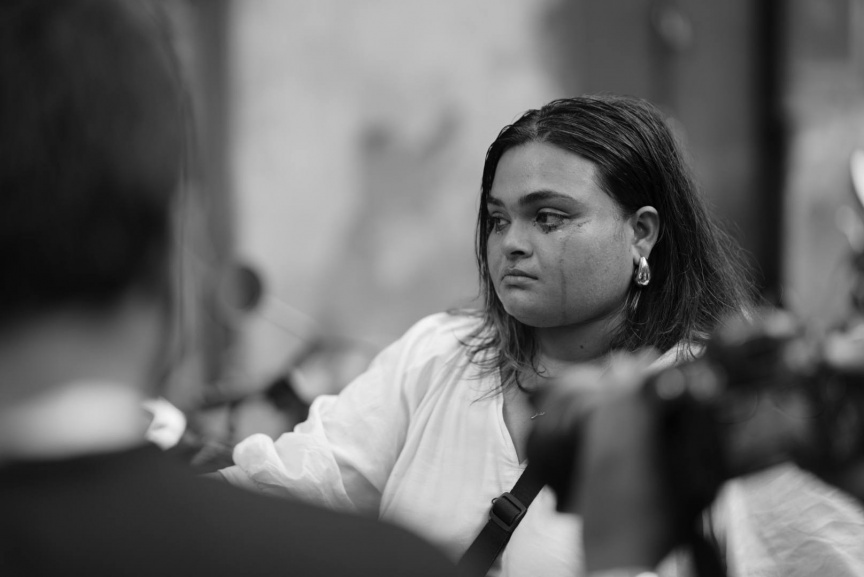
Protesting journalists sustain injuries as they are pushed back by police from outside the Parliament Building ahead of a vote on a contentious media bill on September 16, 2025. (Sun Photo/Ahmed Firyal)
The Human Rights Commission of Maldives (HRCM) announced on Tuesday that it is investigation allegations that the police used excessive force in dismantling a demonstration last week, as journalists gathered outside the Parliament Building to protest against contentious new media legislature.
The hours-long protest took place on September 16 amid a Parliament vote on new legislature replaces the existing self-regulatory system with a government-controlled commission. Journalists began gathering outside the Parliament Building at around 08:30 am, and were later joined by members of the general public and members of the main opposition Maldivian Democratic Party (MDP).
Clashes during the protest resulted in injuries to several protestors. At least two protestors were detained, but released shortly after.

In a statement on Tuesday, the HRCM said its officials had closely monitored the protest.
The rights watchdog said it is collecting information and investigating how the demonstration unfolded, as well as the allegations that the police used excessive force against protestors.
“And we note that cases related to the protest are under investigation by the commission’s Anti-Torture Section,” reads the statement.
HRCM said they will be providing an update once the investigations wrap up.
The MDP had filed a case the National Integrity Commission (NIC) on September 17, asking for an inquiry into allegations of police brutality during the protest – allegations that the police deny.
In a statement a day later, the police insisted that officers acted strictly in line with operational protocols and applied only the minimum force necessary in dismantling the protest – a protest that they stressed constituted to an unlawful assembly under existing laws.

The police said that officers exercised “maximum restraint” in managing the situation, and used only limited physical restraint where necessary, without major injury to either protesters or officers.
“No tear gas, pepper spray, batons, or other crowd-control devices were deployed. Officers relied solely on communication, guidance, and professional engagement to disperse the crowd. Where necessary, limited physical restraint was applied to prevent escalation and ensure safety,” reads the statement.
“The Maldives Police Service firmly rejects allegations of brutality. At all stages of the operation, officers acted strictly in line with operational protocols, applying only the minimum force necessary to preserve order and safeguard both demonstrators and law enforcement officers.”
While the police deny allegations of brutality, several journalists who joined the protest claim the police had used excessive force, resulting in injuries.

The police conduct during the protest is also the subject of an internal review by the Professional Standards Command.
While the police insisted that the allegations of brutality were false, it also promised to take appropriate disciplinary or legal measures, should any breach of protocol or misconduct be identified during the review.
The contentious new media legislature that sparked the protest was ratified by President Dr. Mohamed Muizzu on September 18, despite appeals from both local and international organizations urging him against enacting the new legislature over its potential implications for press freedom and free speech in the Maldives.
While journalist protest against the new law as a direct threat to press freedom and a crackdown on dissent, President Muizzu’s administration touts it as important legislature that protects people from defamation, disinformation and misinformation, and paves the path for accountability in the media field.